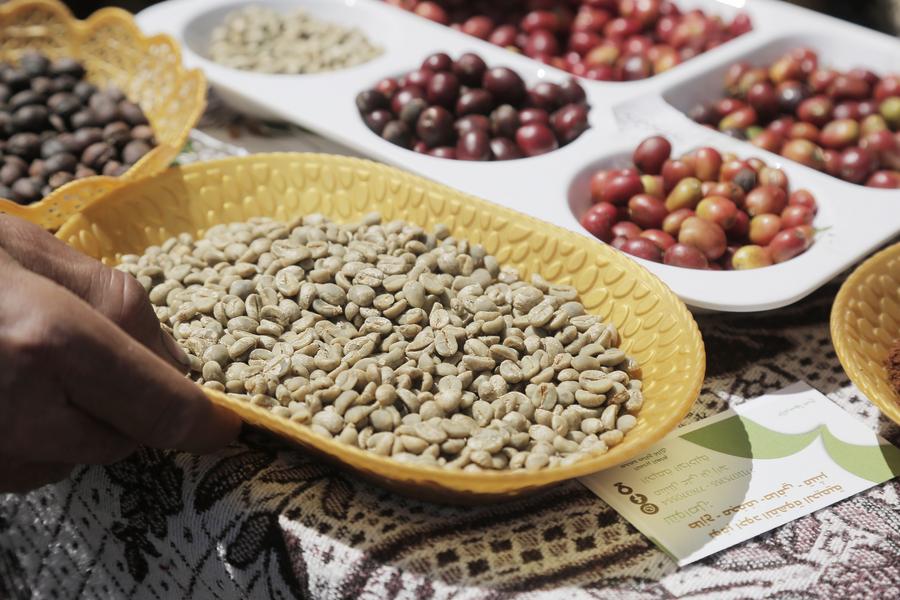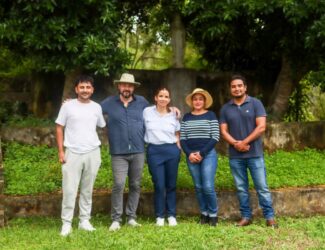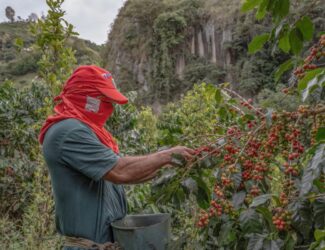
Xinhua: In Yemen’s Highlands, Hope Persists Where Coffee Grows
Dubai, August 10, 2025 – (Qahwa World) – China’s Xinhua News Agency has published a captivating report about coffee in Yemen, titled “Letter from the Middle East: In Yemen’s Highlands, Hope Persists Where Coffee Grows”, written by Xinhua journalist Yin Ke, who—judging from her piece—appears to have a deep affection for Sana’a and a keen understanding of Haraz and its place in the coffee world.
Yin Ke opens her report with this touching line: “As the first rays of sunlight crested the rugged hills of Haraz in western Yemen, I met Ahmad Ali Nassim, a fifty-year-old farmer, his hands already stained with the sap of coffee trees from his early morning work.”
We stood on a narrow path winding between stone terraces, the air crisp and carrying the fragrance of wild herbs and ripening coffee cherries.
Pointing to a branch laden with red berries, he said: “This tree has seen both war and storms, just like us.”
Six centuries ago, the Haraz highlands were already celebrated as one of the birthplaces of Yemen’s traditional coffee. With their high altitude, unique rocky soil, and humid climate, the mountains offer exceptional growing conditions that seem almost destined for producing some of the world’s finest coffee.
Nassim recalls: “Every harvest was already spoken for. All we had to do was keep the trees alive and maintain the irrigation systems.”
But all that changed with the outbreak of Yemen’s civil war in 2014.
As the conflict dragged on, some farmers were forced to abandon their land in search of safety. Yemen’s coffee industry suffered a devastating blow—production nearly ground to a halt, and thriving coffee plantations were replaced by qat, a stimulant plant similar to tobacco.
Yet, even amid war and displacement, locals never forgot the coffee trees they had planted with their own hands. Nassim says: “The coffee trees on the mountains—that’s home for us.”
Since 2020, northern Yemen has seen gradual stability return, and farmers from Haraz have made their way back, removing qat bushes and planting new coffee seedlings.
Despite the hardships, life moves forward. Nassim adds: “As long as the coffee trees are alive, there is hope for us,” his eyes brightening as he gazes at the ripening coffee cherries.
He whispers: “This land is coming back to life. Just as people start their day with coffee, for us farmers, these trees mark the start of a new chapter.”
For Yemenis, coffee is a precise measure of daily life. As trade in coffee beans between Nassim and other farmers grows, lines of customers outside local cafés tell a quiet story of renewal—a sign that society is regaining its footing.
At a small exhibition of local products in Sana’a’s Old City, I met Wafa Abdullah, a young organizer who likened coffee to Yemen’s resilience.
“People call oil black gold,” she said, “but our coffee is just as valuable. It connects us to others and the world, and it sustains families on the land.”
In the final days of my visit, reports emerged of renewed clashes between Houthi forces and government troops.
I asked Nassim whether he would leave again if violence escalated. He led me to a small coffee seedling he had planted two seasons earlier, its green leaves vibrant against the cracked, dry earth.
Softly, he said: “Like this coffee tree, I won’t leave this time. This land is our roots.”



